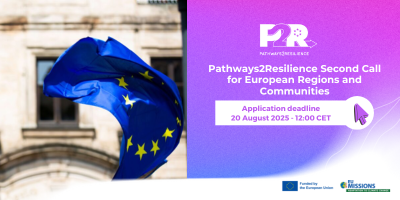In the 21st century, humanity stands at a pivotal crossroads as the planet faces unprecedented threats with major consequences of climate change and biodiversity loss. The nexus between climate and biodiversity is not just a matter of environmental concern; it is an intricate web that encompasses economic, social, and cultural dimensions.
The recent Intergovernmental Panel on Climate Change (IPCC) Sixth Assessment Report on Climate Change paints a stark picture of irreversible risks facing humanity. However, it also presents pathways to mitigate the damage by recognizing the intrinsic interconnection of climate, ecosystems, biodiversity, and human societies.
This urgent need for coherent, integrated approaches to address the twin crises of climate change and biodiversity loss is specially underscored in Target 8 of the Kunming-Montreal Global Biodiversity Framework (KMGBF), which emphasizes the key role of regional governments.
With this in mind and in the context of the recent UNFCCC COP 28, the Post 2020 Biodiversity Framework – EU Support, Regions4 and the European Committee of the Regions co-organized a side-event entitled “Tackling the twin crises of climate and biodiversity loss: ambition and action from regional governments to build resilience”.
The session, that took place on 11 December 2023 at the EU Pavilion, shed light on the critical role of subnational governments in addressing these two interconnected challenges.

Juan Manuel Moreno Bonilla, President of Andalusia, delivered high-level remarks that spoke to the urgency of local and regional action: “(…) we see first-hand impacts, notably for water management and the protection of ecosystems in Andalusia (…) It is time to confront the dual crisis, which must be a planetary priority (and) give greater weight to local and regional governments because they must participate in achieving global goals in the fight against biodiversity loss and climate change”.
“In the face of unprecedented risks posed by the escalating climate and biodiversity loss crises, regional governments are not waiting – they are leading. They are in a unique position to be drivers of change with transformative solutions that consider local contexts and realities, showcasing that bottom-up, integrated systems can effectively support national and global environmental targets“, highlighted Natalia Uribe, Regions4 Secretary-General
Harnessing Subnational Leadership for Global Impact
CBD COP15 delivered the Kunming-Montreal Global Biodiversity Framework (KMGBF) that recognizes the ever more importance of an inclusive approach to implementation.
Keynote speaker David Cooper, Acting Executive Secretary, CBD, recalled that the Framework will only be “(…) successful if it is implemented with a whole-of- government and whole-of-society approach. Subnational and local authorities contribute to mainstreaming climate and biodiversity objectives across all levels of governance, across sectors, and across generations. They are taking effective action in support of both agendas, moving the Framework from agreement to action”.
Especially relevant for subnational governments are the following three KMGBF targets:
Target 12, on connectivity of urban and densely populated areas
Target 14, on biodiversity mainstreaming at all levels of government
Target 18, on the elimination, phase out of reform of subsidies harmful to biodiversity by 2025
These targets highlight the need for coordinated efforts at the regional level to achieve the overarching goals of the KMGBF, further emphasizing the pivotal role of subnational governments in global biodiversity conservation.
“Our project has found that subnational governments are invaluable stakeholders when it comes to tackling both the climate and biodiversity crises in a coherent and holistic way. Their commitment and transformative actions on the issue are an example that can be replicated at the national level and serve as inspiration to all stakeholders.”, marked Hugo Rivera Mendoza, Team Leader, Post 2020 Biodiversity Framework – EU Support
The panel showcased best practices on subnational ambition actions to address the twin crises. Moderated by Jordan Harris, Regions4 Executive Director, the panelists featured in the event were leading regional and local leaders who spoke of their concrete solutions and challenges to both crises.

An inspiring conversation with the audience followed the panel and concluded that the urgency to address these intertwined challenges has never been more pressing. The global community stands at a crossroad where the decisions and actions taken today will reverberate through generations, shaping the trajectory of life on Earth.


As keynote speaker, Grethel Aguilar, Director General IUCN pointed out: “The most powerful force for change is a community of people that want to make a difference, and regional and local leaders have showcased their readiness to halt both crises.”
Policy Brief on Transformative Multilevel Action: Subnational Solutions for Climate & Biodiversity
Aligned with the key messages of the event, Regions4 experts, with the support of the Post2020 Biodiversity Framework EU Support project, launched the policy brief titled “Transformative Multilevel Action: Subnational Solutions For Climate & Biodiversity” to address the importance of subnational governments as innovation laboratories for local and inclusive solutions to the dual climate and biodiversity crises.
With the support of CREAF, Regions4 also released a video inspired by the policy brief’s key ideas.
CREAF is a public research center dedicated to terrestrial ecology, territorial analysis and global change, specialized in production and dissemination of knowledge on conservation and management of the environment change at local, regional and global scales. CREAF functions as a bridge between academia, administrations, and society and promoting awareness within its scope of activities.
Watch the video here:
THIS COMMUNICATION PLAN IS FUNDED BY THE EUROPEAN UNION. ITS CONTENTS ARE THE SOLE RESPONSIBILITY OF THE POST 2020 BIODIVERSITY FRAMEWORK-EU SUPPORT PROJECT AND DO NOT NECESSARILY REFLECT THE VIEWS OF THE EUROPEAN UNION.




